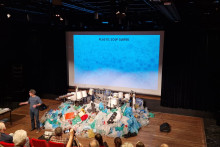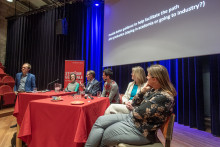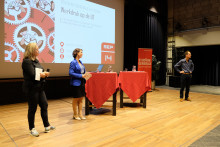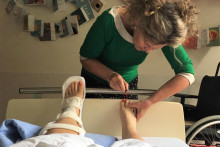Tinga believes that we overlook the amount of plastic we use and how destructive it is for the environment. ‘Nowadays, plastic is an everyday material. It is everywhere; where we live, where we sleep, what we eat from and what we drink from. All the plastic being produced every year, equals the number of humans on our planet.’ ‘We tend to forget that plastic has been designed by chemists in laboratories and is mass produced’, he adds. ‘It is not biodegradable and every product we manufacture has to be handled with the utmost care.’
‘I want to make a statement’
Only about a decade ago did Tinga realise the degree of pollution at the Dutch coast. ‘I always went kite surfing with a friend of mine and it was about ten years ago when I started seeing plastic wash up on the beaches.’ That is when he knew that something had to be done. ‘I saw all that plastic and I said to myself that I want to make a statement.’
He decided to make a surfboard using only plastic waste, an ironing rod and a fire torch. Tinga wanted to travel with this board, from Belgium to the German island of Borkum, a distance of 450 kilometres. ‘I wanted to show that my board is made with the same amount of plastic that washes up on the beach every month, every 250 meters.’
After three days of kite surfing, Tinga washed ashore and could not continue his travel. ‘Because my board was heavy and it was made of a fishing rope, I sustained injuries on my hands and feet, while also experiencing a fever.’
At this point, the only thing Tinga had earned was his nickname, ‘The Plastic Soup Surfer’. One thing that he has learned from this experience is that ‘awareness alone does not change anything.’ ‘We all wrestle with what we know we should do, and how we act.’
Sixty thousand sugar hearts
A year later, Tinga went sailing with his family over the Baltic, Swedish and Norwegian sea and noticed that plastic waste travelled from many different locations. ‘Surprisingly packaging and bottles found at the Swedish coast were Korean, English and Dutch’, he says.
At this moment, Tinga was considering his next steps and decided to do what he does best. ‘I once again, decided to build a surfboard, but this time asked someone to build it for me. I planned to travel from Scheveningen to England in six hours. Instead, I arrived three hours later.’
Tinga took this journey to get support for his petition. It took him half a year to collect sixty thousand signatures and bring his resolution in at the Dutch parliament. ‘Instead of bringing sixty thousand signatures, I brought sixty thousand sugar hearts, for the politicians because I wanted their signatures. In my resolution I stated that I want 90 percent less littered plastic bottles within three years. Just like that all the politicians signed,’ explains Tinga. This resolution became the basis of the deposit return system for plastic bottles and aluminium cans in the Netherlands.
‘Do what you can, and what you must’
Tinga also talked to CEOs of big companies and handed them a ‘declaration of awareness’. ‘You always have people that dodge the policy by claiming that they are going to use drinking carton, although it contains many layers of plastic.’ That’s why Tinga has developed an application called Plastic Avenger Manifesto, where people can take photos of carton or plastic waste and upload it in the app.
Tinga believes that whatever we do, we should take it step by step and not get discouraged. ‘Do what you can, and what you must.’
Soundtrack of the plastic age
At the end of the lecture, percussionist Rogier de Nijs and his group performed a ‘soundtrack of the plastic age’ using instruments entirely made out of plastic.







